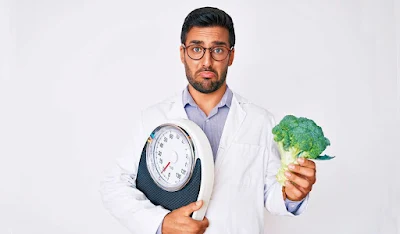Why can't you lose weight even if you try?
Let's see some of the 7 reasons why you can't lose weight even if you try.
Many people get frustrated when their efforts to lose weight don't give the expected results. They go on restrictive diets, join the gym, deprive themselves of their favorite foods... and still, the scale doesn't move or even rise. What's going on? Why can't they lose weight even if they try?
See The Japanese method to lose weight through breathing
 |
| Why can't you lose weight even if you try? |
You are eating less than you need
Although it may seem contradictory, eating too little can be counterproductive to losing weight. When the body detects that it is not receiving enough energy, it goes into saving mode and reduces caloric expenditure. Also, eating too little can lead to anxiety, hunger and cravings, making it difficult to maintain a balanced and healthy diet. The ideal is to eat enough to cover your nutritional needs and create a moderate caloric deficit that allows you to lose weight gradually and sustainably.
You're not eating what you need
Not all calories are the same, nor do all foods have the same effect on the body. Some foods are more filling, nutritious and beneficial to health than others. For example, protein and healthy fats help you feel full longer, while refined carbohydrates and sugars give you quick energy but also raise your insulin level and promote fat storage. For this reason, it is important to choose what you eat well and prioritize natural, fresh, and quality foods over processed, packaged, and ultra-caloric foods.
You are not doing the right exercise
Physical exercise is essential to improve health, mood and body composition. However, not all types of exercise have the same impact on weight loss. Some people focus only on cardio, thinking it will burn more calories, but forget about the importance of strength training to increase muscle mass and basal metabolism. Other people do only isolation exercises, such as crunches or biceps, but they don't work the whole body or with enough intensity to generate an effective stimulus. The ideal is to combine different exercise modalities, such as HIIT (high intensity interval training), functional training or crossfit, which allow you to work the whole body, burn fat and gain muscle.
You are under a lot of stress
Stress is one of the worst enemies of losing weight. When we are stressed, our body releases a hormone called cortisol, which has several functions related to survival.
One of them is to increase the appetite and desire for sweet and fatty foods, which give us a feeling of pleasure and reward. Another is to favor the accumulation of visceral fat, which is the most dangerous for health and the most difficult to eliminate. For this reason, it is essential to learn to manage stress and find ways to relax and disconnect, such as meditating, breathing deeply, doing yoga or listening to music.
You don't sleep enough
Sleep is another key factor in regulating body weight. When we sleep poorly or little, our body undergoes a hormonal alteration that affects appetite and metabolism.
On the one hand, the production of leptin is reduced, which is the hormone that tells us that we are satiated. On the other hand, the production of ghrelin is increased, which is the hormone that stimulates us to eat. In addition, poor or little sleep makes us feel tired, irritable and less willing to exercise. Therefore, it is important to sleep between 7 and 9 hours each night, in a dark, quiet and comfortable environment.
You don't hydrate enough
Water is essential for the proper functioning of the body and for weight loss. Water helps us eliminate toxins, regulate body temperature, transport nutrients and improve digestion. In addition, water helps us feel satiated and avoid the confusion between hunger and thirst, which sometimes leads us to eat more than we need. For this reason, it is important to drink between 1.5 and 2 liters of water a day, preferably outside of meals and without adding sugar or sweeteners.
Do you have any health problems?
Sometimes the difficulty losing weight can be related to a health problem that affects metabolism or hormones. Some of the most common conditions that can interfere with weight loss are hypothyroidism, polycystic ovarian syndrome, insulin resistance, diabetes, or depression. If you suspect that you may have any of these problems, it is best to consult your doctor and have the relevant tests done to rule them out or treat them appropriately.
Do not give up
As you can see, there are many reasons why you can't lose weight even if you try. Do not get discouraged or give up, but analyze your situation and find ways to improve your habits and lifestyle. Remember that losing weight is not a matter of going on a temporary diet, but of adopting a healthy, varied and balanced diet, exercising regularly, taking care of your mental and physical health and being constant and patient. If you need professional help, do not hesitate to go to a nutritionist or a personal trainer to advise you and guide you in your process. Cheer up and forward!





Comments
Post a Comment